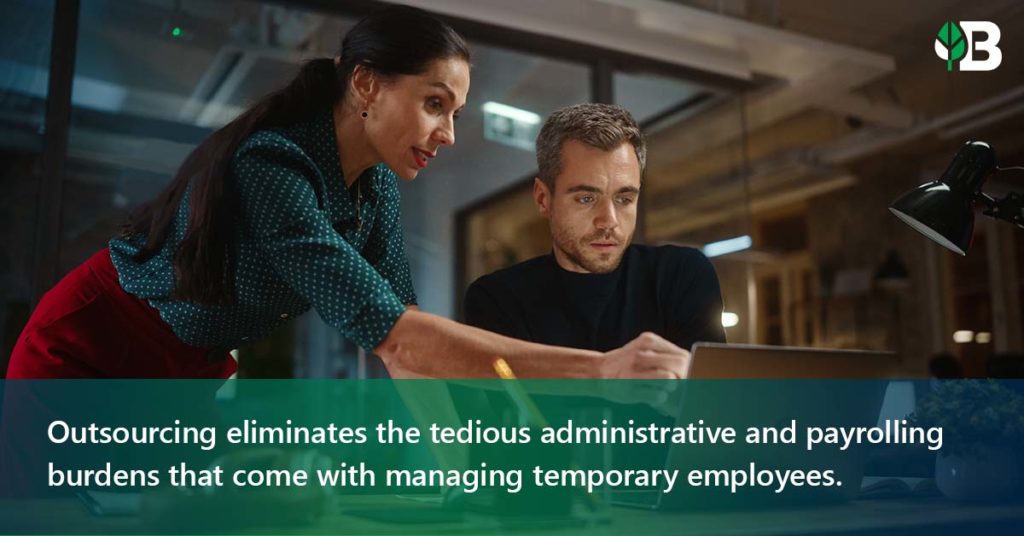
Should You Partner With an Employer of Record?
Partnering with an employer of record (EOR) helps take the burden out of hiring a contingent workforce. There are many reasons companies use this strategy for hiring and managing their indirect hires, including saving valuable resources, reducing hiring risk, and getting the help you need quickly and efficiently. However, that doesn’t necessarily mean an EOR is the right fit for every organization. How can you be sure that this strategy is the best one for your team? In this post, we’ll walk through a list of scenarios when an employer of record is the right fit, and when it isn’t.
Employer of Record: Defined
An employer of record’s purpose is to serve as the official employer for a contingent worker (or set of workers) on behalf of another company. The EOR can handle a wide range of administrative tasks when growing your team. From payroll to screening, to workers’ compensation insurance, and more. Many of the most grueling parts of the hiring process can be taken off your plate, freeing up time and resources to focus on other aspects of the business.
When Should You Partner With an Employer of Record?
When you need to hire contingent talent, FAST
By partnering with an EOR, you significantly cut the amount of time you have to spend on finding and hiring employees. Your employer of record will take on many of the administrative and logistics duties associated with hiring, including sourcing, drug screenings, back-end onboarding paperwork, and more. Your employer of record partners are experts in all of these tasks and can handle them quickly and efficiently so you can get the help you need fast.
When you’re looking to hire, but have budgetary constraints
Let’s face it, finding talent is expensive, and time is money. It takes time to find and onboard candidates, which is time taken away from other essential, important business-related tasks. Many EOR companies provide payrolling services at very competitive rates. Freeing up the time your team would have spent on administrative tasks will allow them to make more valuable contributions to your bottom line.
You have a small HR or administration department and don’t want to overburden them
Your human resources team manages countless important business and personnel tasks. When you add onboarding and hiring to their list of to-dos, your team will be stretched pretty thin. Partnering with an EOR takes some of the administrative pressure off of your HR team, so they have more time to help you manage your business.
You are looking for contingent employees
Regularly onboarding and offboarding temporary workers can monopolize your time. EORs can take over those duties, and other personnel duties so you can focus on your full-time hires.
You want the option to bring your temporary employees on full time in the future
Even after sorting through resumes, screening, and interviewing, you can never be sure if an employee is the right fit until you actually put them to work and have them interact with your team. The EOR model is a great option for businesses who want a little more assurance before formally adding a new member to their team. EORs allow flexibility to hire temporary or part-time workers now, with the EOR serving as the statutory employer. If it turns out that these workers are a great fit for your team, many employer of record partners will convert them to your payroll at little to no cost.
You are hiring outside of your local area
Hiring remote workers in another region or state can come with a whole slew of challenges and risks. It’s important to ensure that these employees are being paid at a fair local rate and are provided with benefits that comply with local laws and regulations. An employer of record can help you stay compliant no matter where your employees are located, giving you peace of mind that your remote hires are being treated fairly.
Are there any reasons not to use an EOR?
Of course! An EOR partnership isn’t for everyone, and there are a few reasons you might want to avoid working with an EOR.
You only need a payroll company
If you are looking for someone to handle timesheets, salary calculations, cutting checks, and/or directly depositing funds for your current employees, you are not looking for an employer of record! This is a common misconception, as another name for an EOR is a “payrolling service,” not to be confused with a “payroll service.”
You are looking to hire direct employees, rather than a contractor
While you can easily transfer contingent employees managed by an EOR to full-time employment under your management, if you are looking for a permanent employee from the start, an EOR is most likely not the right fit for you.
You are looking for a more hands-on hiring experience
If you are looking for a strong connection with new hires from the start and hoping to be able to have a large amount of control over the hiring process of temporary employees, you will not find that in an employer of record. One of the benefits of partnering with an EOR is that the stress and work of hiring are out of your hands, but this can also be a stressor if you want to be an integral part of that process. In this case look to an RPO solution.
You have a robust, built-out HR and recruiting department
If you have built out your recruiting department, you most likely already have employees whose primary responsibility is to recruit, onboard, and manage employees. There’s no need to use an EOR.
Are you the right fit for an EOR?
If you need to onboard contingent workers, partnering with an EOR could be a critical step in your hiring journey. A good employer of record partner will take the stress out of hiring, onboarding, and talent management processes so you can focus on other important tasks. If you still have questions about EOR or are ready to talk about employer of record services for your business, contact us!




